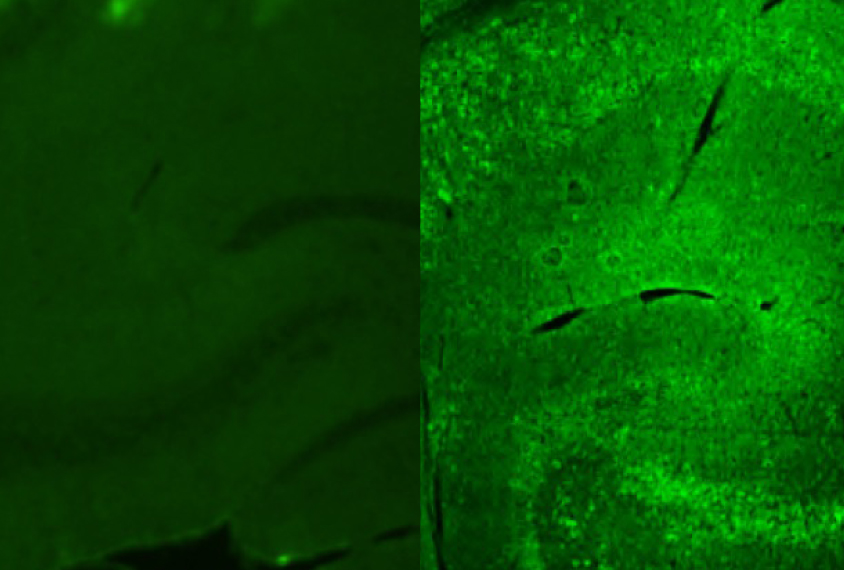
THIS ARTICLE IS MORE THAN FIVE YEARS OLD
This article is more than five years old. Autism research — and science in general — is constantly evolving, so older articles may contain information or theories that have been reevaluated since their original publication date.
Editor’s Note
This article was originally published 21 October 2015, based on preliminary data presented at the 2015 Society for Neuroscience annual meeting in Chicago. We have updated the article following publication of the study 4 October 2016 in Molecular Psychiatry2. Updates appear below in brackets.
Rare antibodies taken from the blood of women who have a child with autism cause brain structure changes and autism-like symptoms in male mice, according to results presented today at the 2015 Society for Neuroscience annual meeting in Chicago. The findings add to mounting evidence linking immune factors in women to an increased risk of autism in their children.
“Our study is the first to isolate a single brain-reactive maternal antibody and to provide evidence that it can lead to autism,” says Lior Brimberg, a postdoctoral fellow in Betty Diamond’s lab at the Feinstein Institute for Medical Research in Manhasset, New York, who presented the findings.
Antibodies are immune molecules that help defend the body against pathogens by binding tightly to specific proteins. Antibodies normally cannot flow from the bloodstream into the brain in people, but can enter the placenta and may cause trouble in the developing fetal brain.
In 2013, Brimberg and her colleagues found that women who have a child with autism are about four times as likely as women of childbearing age in the general population to carry antibodies that bind to mouse brain tissue1. This finding raised the question of whether these brain-reactive antibodies play a causal role in the disorder or simply serve as a marker for increased risk.
In the new study, the researchers isolated 20 brain-reactive antibodies from some of these women and screened them to determine which proteins they bind to. They were intrigued by one particular antibody that binds to the protein CASPR2, which is encoded by the autism risk gene CNTNAP2. Of the women in the 2013 study who carry brain-reactive antibodies, 37 percent (20 out of 53) produce antibodies that are reactive against CASPR2, the researchers found. [By contrast, 12 percent (6 out of 51) of women of childbearing age and about 8 percent (4 of 52) of women who have a typically developing child carry antibodies that react to CASPR22.]
Thinner brains:
Brimberg’s team injected pregnant mice with this antibody or a control antibody from a woman who does not have a child with autism. The male pups of the mice exposed to the autism-linked antibody socialize less with other mice and bury more marbles than do the male pups born to controls. They are also slower to learn a new path through a maze after mastering a different one. These behaviors are reminiscent of the social deficits, repetitive behaviors and learning problems seen in children with autism. Interestingly, female pups do not show any of these deficits.
Treatment with the anti-CASPR2 antibody triggers structural changes in the brains of male mouse embryos. The developing cerebral cortex — the brain’s outer layer —is thinner and has fewer dividing cells than that of controls. Here, too, the female mice are unaffected.
These antibody-triggered brain differences persist into adulthood. The males grow up to have fewer neurons in the cerebral cortex. And in the hippocampus, which governs learning and memory, one type of neuron is reduced in number. Hippocampal neurons also have fewer dendrites, the signal-receiving projections of neurons. Fewer dendrites have also been found in the brains of mice that lack CNTNAP2.
The findings jibe with numerous reports suggesting that immune dysfunction during pregnancy increases the risk of having a child with autism. For example, women with the autoimmune disorder lupus are about twice as likely as women in the general population to have a child with autism. Having a severe infection during pregnancy also increases the risk slightly.
Next, Brimberg and her colleagues aim to determine exactly where on the CASPR2 protein this antibody binds. “Then we can develop reagents to block it,” she says.
Still, Brimberg is quick to point out that many of the women in the study who carry brain-reactive antibodies also have typically developing children. “There’s probably some sort of gene-environment interaction that we need to figure out,” she says.
For more reports from the 2015 Society for Neuroscience annual meeting, please click here.
Correction: This article has been modified from the original to reflect the fact that researchers compared women who have a child with autism with women of childbearing age in the general population, not with women who do not have a child on the spectrum, as previously stated.
By joining the discussion, you agree to our privacy policy.